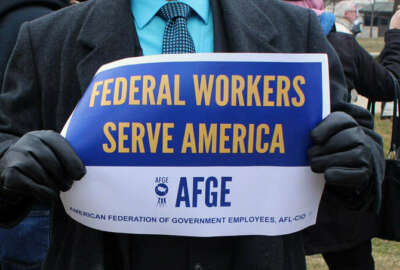
3 recent FLRA decisions that may shift collective bargaining negotiations
The Federal Labor Relations Authority issued three recent decisions on behalf of three separate departments, all of which will likely give agencies more power a...
The Federal Labor Relations Authority published three decisions last week that have the potential to change the course of agency collective bargaining negotiations with their unions.
The decisions, for example, limit the kinds of policy changes that federal employee unions can bargain over. All told, the three decisions give agencies more authority at the bargaining table.
FLRA Chairman Colleen Duffy Kiko and James Abbott made the three decisions, with Ernest DuBester, the lone Democrat, dissenting on all of them.
Unions and DuBester argue these decisions upend federal labor-relations law and years of legal interpretations and precedent.
The first decision came at the request of the Education and Agriculture Departments, which asked FLRA to weigh in on the standards they should use to determine whether they need to bargain over management-directed policy changes.
In general, agencies must bargain over changes they make to “conditions of employment,” otherwise known as “personnel policies, practices, and matters” that affect employee working conditions.
Agencies don’t have to bargain over all these changes, but the FLRA in the past has applied two different standards over what should trigger collective bargaining. On one hand, the authority has said agencies should bargain over the changes that have a “substantial impact” on conditions of employment.
But more recently, the authority has said agencies should bargain with their unions on policy changes that have a “more than de minimus” impact on employees. Agriculture and Education argued the “more than de minimus” standard is too vague and has subsequently had a negative impact on federal labor relations.
In a 2-1 decision issued last week, the FLRA agreed.
“In our view, because the de minimis test has been drained of any determinative meaning, it is now incumbent on us to reexamine and clarify when management‑initiated changes have a sufficiently significant impact on conditions of employment to require bargaining,” FLRA members wrote.
The term “de minimus” suggests triviality, the FLRA said, and it’s inappropriate to compel agencies to bargain over topics that are “barely more than trivial.”
Moving forward, agencies are only required to bargain over management-initiated changes that have a “substantial impact on a condition of employment,” the FLRA’s decision reads.
DuBester, the lone Democrat on the FLRA, described the authority’s analysis as “flawed at every step.”
“It concludes that the de minimis doctrine has ‘negatively impacted labor-management relations’ based solely upon conclusory assertions made by the two agencies that requested the policy statement,” he wrote in a lengthy dissent. “It misconstrues precedent setting forth the authority’s rationale for adopting the de minimis standard. It ignores federal court decisions explaining the basis for the de minimis doctrine and defining the permissible limits of its application. And rather than providing our parties with a ‘meaningful and determinative’ standard to replace the de minimis standard, the majority’s decision will generate confusion and litigation over what this new standard actually means.”
With the FLRA’s decision, agencies can reject a union’s request to bargain over a new policy based on their own interpretation that the policy change itself won’t have have a substantial impact on employee working conditions.
Continuous provisions
The second decision came at the request of USDA’s general counsel. In this case, USDA asked the authority to clarify when specifically an agency head can review the legality of an expiring collective bargaining agreement that automatically rolls over and continues in full force until both parties negotiate a new contract.
In particular, agencies like USDA are seeking clearer guidance on when they can implement governmentwide regulations that became effective during the course of their collective bargaining agreements with their unions — and whether agencies can implement those regulations when bargaining agreements have technically expired but have rolled over under a “continuance provision.”
Arbitrators’ interpretations of these “continuance” provisions have been “inconsistent and unpredictable,” USDA argued.
This particular debate has been on display as agencies attempt to implement the president’s 2018 workforce executive orders on official time and collective bargaining. Unions have disputed agency attempts at implementing the president’s EOs while their contracts have rolled over or as they negotiate new agreements.
Ultimately, the FLRA determined governmentwide regulations that became effective during the previous collective bargaining agreement will become operational on the first day a collective bargaining agreement rolls over into the contract’s “extension period,” therefore beginning a new term.
In essence, the authority’s decision may allow agencies to more quickly implement new government regulations they couldn’t before. But in dissenting the FLRA’s decision, DuBester said he could only speculate how it might impact an actual collective bargaining agreement because the authority didn’t examine specific contract language.
‘Zipper’ clauses
The final FLRA decision came at the request of the Office of Personnel Management. Specifically, OPM wanted the authority’s opinion on whether provisions limiting mid-term bargaining during the term of an agreement, otherwise known as “zipper clauses” are mandatory bargaining subjects.
OPM believes they should be, meaning agencies could bargain those provisions to impasse.
“Finding zipper clauses to be mandatory will allow agencies and unions to clearly define their bargaining obligations during the term of an agreement,” the authority said in summarizing OPM’s arguments. “As a result, the petitioner argues that zipper clauses may potentially avoid disputes about midterm bargaining, reduce the number of unfair‑labor‑practice charges regarding midterm proposals, and create more efficiency during midterm bargaining.”
The FLRA agreed: “We now hold that proposals that concern midterm‑bargaining obligations — whether they resemble reopener or zipper clauses, or take some other form — are mandatory subjects of bargaining under the [Federal Service Labor-Management Relations] Statute,” the authority said.
In making this decision, FLRA grappled with years of debate between the Supreme Court and the U.S. Court of Appeals. Ultimately, the FLRA determined it had the authority to weigh in on the matter.
Federal employee unions were quick to denounce the FLRA’s three recent decisions.
“Make no mistake, these are just the most recent in a four-year string of meritless decisions that must be overturned by a new administration and a new FLRA, properly constituted, to restore fairness and decency to the federal government,” Everett Kelley, national president of the American Federation of Government Employees, said late last week in a statement.
AFGE said it would explore its legal options to challenge these recent FLRA decisions.
The authority has been busy in recent years issuing decisions at the request of the administration. FLRA, for example, finalized a new rule earlier this year that allows dues-paying employees to cancel automatic payments to federal unions at any time.
Dues-paying members had a once-annual window to cancel those payments in the past.
Copyright © 2024 Federal News Network. All rights reserved. This website is not intended for users located within the European Economic Area.
Nicole Ogrysko is a reporter for Federal News Network focusing on the federal workforce and federal pay and benefits.
Follow @nogryskoWFED
Related Stories






